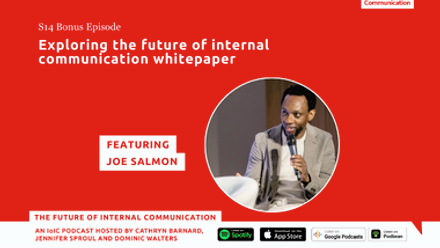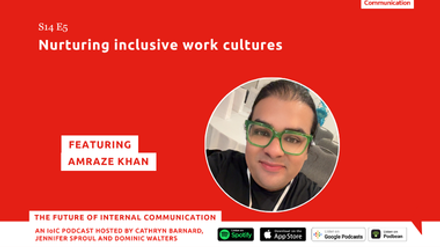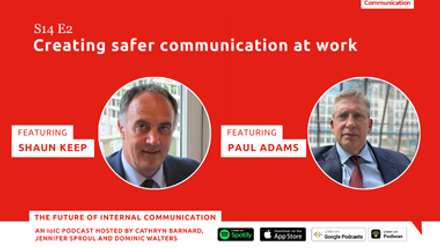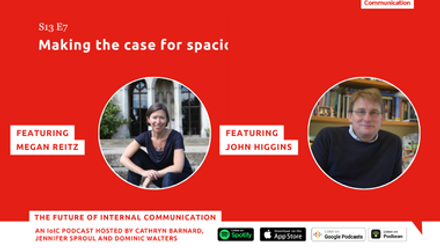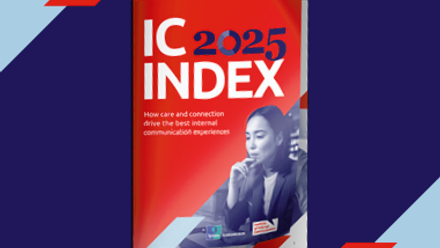Executive Summary
As global stability deteriorates, anxiety is on the rise. Internal communicators must assimilate the wants, needs and expectations of increasingly diverse internal stakeholders. Only then can organisations harness the full potential of colleagues across the age spectrum, who are pushing back on top-down, centralised, and increasingly outdated, command and control management archetypes.
In this mercurial new landscape, internal communication is a meta-skill that increasingly underpins organisational success. Our quarterly people updates help internal communication professionals stay informed and think more expansively about ways they can deliver strategic value.
Gen Z’s ‘environmentalism for the mind’ – will it go mainstream in our workplaces?
Gen Z, the first generation to grow up with social media, now largely regrets their screen-dominated childhoods. Research reveals two-thirds of 16–24-year-olds believe social media does more harm than good. Three-quarters want stricter regulation and four-fifths would restrict their own future children's access.
Growing up, this cohort received no health warnings (akin to those found on a box of cigarettes, for example) about social media consumption. Consequently, they’re proactively addressing these issues themselves through an ‘environmentalism for the mind’ approach to wellbeing.
They're embracing analogue socialising through phone-free nightclubs and trends like ‘flip-phone summer’, running clubs, reading groups and ‘digital detox’ events. Organisations like Adele Zeynep Walton's ‘Logging Off Club’ facilitate real-world connections by confiscating phones at social gatherings.
In tandem, at work, Gen Z behaviours such as ‘task masking’ (appearing busy whilst unproductive) and ‘micro-retirement’ (planned extended breaks) have gone viral on social media. Whilst some argue these are simply rebranded routine behaviours, they have sparked debate about work-life blend and definitions of productivity.
Gen Z influencers leverage social media to discuss workplace flexibility, with 92% of Gen Z workers trusting TikTok for career insights. However, nearly half post negatively about employers online, and 55% have followed inaccurate career advice.
2025 Deloitte research highlights how younger workers prioritise purposeful work, mentorship and skills development. So, instead of ignoring or marginalising Gen Z preoccupations, organisations should address underlying workplace culture issues.
Understanding Gen Z trends is crucial because the cohort now comprises a sizeable chunk of the working population – and their behaviours often go viral in the workplace. Organisations that listen and adapt to their authentic communication style and expectations around work will build more resilient, future-ready workforces.
Noteworthy Trends
- 92% of GenZ workers trust TikTok for career insights
- 50% of GenZ workers post negatively about employees online
- 55% have followed inaccurate career advice
Moving from ‘soft’ to ‘vital’ skills for the future of work
Organisations face convergent global forces, creating a ‘permacrisis’ of challenge. Next-generation technologies, geopolitical tensions, democratic instability, inequality and climate chaos are fuelling unprecedented uncertainty across all sectors. What have been traditionally referred to as ‘hard’ skills, acquired through education and training, are increasingly transient as they are continuously reshaped by technological advancement.
One of the most significant workplace trends emerging in response involves a shift in language. Organisations are now relabelling ‘soft’ skills as ‘vital’ or ‘power’ skills. These are essentially the strategic competencies and capabilities that directly drive business results. They are increasingly recognised as critical for success. After all, deeply human, nuanced abilities are almost always impossible for AI to replicate, due to their context-specific nature.
Continuous learning is now an imperative for businesses and individuals seeking future relevance. Possessing vital skills underpins learning agility and the ability to embrace the continuous change that characterises the modern workplaces.
For decades, communication, empathy and strategic thinking have been treated as personality traits rather than learnable and leverageable business skills. This approach has cost companies talent and revenue, because ‘high performers’ often couldn't collaborate, provide feedback or adapt under pressure.
A change in approach occurred when organisations started to connect people skills to profit margins. Data shows managers who create psychological safety enable teams to deliver 67% more breakthrough innovations. Leaders navigating difficult conversations prevent costly disfunction that hampers productivity.
“Successful organisations will need to treat vital skills as competitive advantages – developing them systematically, measuring relentlessly and leveraging strategically. ”
Moving forward, successful organisations will need to treat vital skills as competitive advantages – developing them systematically, measuring relentlessly and leveraging strategically. With AI handling standardised technical work, humans' ability to think, connect and adapt becomes the key sustainable differentiator.
Internal communicators can lead this cultural transformation by nurturing attitudes and attributes that support the adaptability required. Reframing soft skills as key business capabilities and promoting continuous learning programmes helps embed the importance of vital skills development into our organisational and strategic messaging.
Why internal communication must prioritise human connection in challenging times
When organisations continue to prioritise familiar communication challenges – such as attention disruption, engagement, connecting with distributed and multi-generational colleagues – they risk overlooking a fundamental shift that’s quietly bubbling away in the margins.
In today's turbulent landscape, where leadership changes, AI advancement and evolving work patterns escalate uncertainty, the quality of human connection has become paramount to organisational sustainability.
The 2025 IC Index reveals exceptional internal communication experiences share a common thread: employees feel meaningfully connected to leaders who genuinely listen, understand their challenges and demonstrate authentic care.
Yet a mere 13% of UK employees rate their organisation's internal communication as outstanding. Just 51% believe leaders understand employee challenges – a figure that falls to 40% in organisations with over 10,000 staff.
This disconnect poses genuine risks.
- Doubt in leaders erodes trust.
- Isolation kills engagement and retention.
- Resilience suffers when confidence breaks down
Internal communicators are uniquely positioned to bridge this gap. By encouraging more personalised, accessible and authentic leadership communication – through active listening sessions and visible responsiveness to employee concerns – they can help transform organisational culture. When communicators facilitate and amplify company-wide human moments, they help demonstrate that leadership truly values colleague perspectives. This helps create the meaningful connections that are essential for sustainable success.
In today’s mercurial world of work, it’s easy to get side-tracked by the latest tech disruptions and overlook the human element. But when it comes to building a strong company culture, nothing is more important than keeping things human.
“Nothing is more important than keeping things human."
Loneliness is a business risk, not just a wellbeing challenge
Workplace loneliness has evolved from a peripheral wellbeing concern into a critical threat to organisational sustainability. Research by the British Red Cross reveals over one in ten UK workers often or always experience loneliness at work, with nearly half feeling lonely some of the time. The statistics are particularly stark for vulnerable groups. Disabled workers and those with long-term health conditions report loneliness rates of 24% compared to 9% for their colleagues, whilst senior managers face even higher levels at 32%.
The business case for addressing this oft-overlooked crisis is compelling. AAASK research demonstrates workplace loneliness directly undermines organisational performance. 57% of affected employees report reduced engagement, 45% experience burnout and 43% consider leaving their roles. These impacts represent tangible risks to performance, retention and, ultimately, business continuity.
For some, remote working has significantly exacerbated these challenges. 47% of people always or often feel lonely when working from home, with only 12% never experiencing such feelings. Shifts in working patterns have fundamentally altered how employees connect and collaborate.
Gartner's latest workplace predictions also position loneliness as an acute business risk that requires systematic mitigation strategies. In response, organisations must identify key collaboration needs and establish more human-centric interaction norms, possibly even extending support beyond traditional working hours.
These findings underline how none of us operate within ‘one-size-fits-all’ working environments anymore. Internal communication has a role to play here in fomenting a cornerstone solution to this challenge. By fostering meaningful connections, facilitating collaboration and creating inclusive dialogue across all employee groups, it can help transform isolated workforces into engaged communities.
The key take-away? This goes well beyond a wellbeing initiative – it’s also an essential investment in organisational resilience and long-term sustainability.
Key Data Points
-
1 in 10 workers often or always feel lonely at work
- 50% feel lonely at least some of the time
- 24% of disabled workers report loneliness
- 32% of senior managers experience loneliness
Bridging the expertise gap: the strategic role of IC
UK organisations face an unprecedented expertise crisis driven by converging demographic and technological forces.
Boomers, the largest cohort in history, have reached or are rapidly approaching retirement age. This threatens to drain decades of institutional knowledge from the workforce. Simultaneously, GenAI and technological disruption are reshaping traditional skillsets, whilst reducing opportunities for junior employees to develop expertise through conventional pathways.
By 2027, half of all roles are at risk of critical skills shortages. Retiring workers, AI advancements and evolving industry requirements are converging to create a perfect storm of talent scarcity. Demographic shifts across developed economies are intensifying demand for interpersonal skills – talent management, mentoring, empathy and active listening – as organisations struggle to maintain knowledge continuity and foster inclusive environments for ageing workforces.
These challenges reveal the interconnected nature of workforce demographics and skills development, and traditional workplace learning approaches are proving inadequate for this rapidly evolving landscape.
Yet, rather than viewing this crisis as insurmountable, forward-thinking organisations are leveraging collective intelligence through strategic communication initiatives. Internal communicators can encourage colleagues to champion technologies and practices that facilitate seamless knowledge transfer between departing experts and incoming talent.
Organisations that act decisively to harness collective wisdom – encouraging knowledge-sharing, implementing agile learning practices and creating robust mentoring frameworks – will not merely weather this transition period but gain competitive advantage. The expertise gap represents both challenge and opportunity – and those who master internal knowledge flows will emerge the stronger for it in the longer term.
| Challenges | Strategic Responses |
|---|---|
| Baby Boomer retirements draining institutional knowledge | Leverage collective intelligence |
| GenAI reshaping traditional skillsets | Promote knowledge-sharing across generations |
| Fewer pathways for junior employees to develop expertise | Implement agile learning practices |
| Traditional learning approaches proving inadequate | Build robust mentoring frameworks |
Actionable Recommendations
- Understand and engage Gen Z authentically
- Reframe and champion “vital skills”
- Put human connection at the centre of IC
- Address workplace loneliness as a business risk
- Bridge the expertise gap through knowledge flow
Further recommended reading
- https://www.pressreader.com/uk/the-guardian-e-paper-journal/20250307/281479282174184
- https://www.nbcwashington.com/news/local/flip-phone-summer-gen-z-ditch-smartphones-to-disconnect-from-social-media/3958907/
- https://www.adelesnotes.co.uk/
- https://www.deloitte.com/content/dam/assets-shared/docs/campaigns/2025/2025-genz-millennial-survey.pdf
- https://www.forbes.com/sites/lizelting/2025/07/17/gen-z-work-trends-like-task-masking-go-viral-heres-how-leaders-can-adapt/
- https://workingthefuture.com/wtfsu-wtf-vital-skills
- https://theconversation.com/why-power-skills-formerly-known-as-soft-skills-are-the-key-to-business-success-257310
- https://www.fastcompany.com/91367450/the-most-surprising-workplace-trends-of-2025-so-far-workplace-trends
- https://www.ioic.org.uk/knowledge-hub/thought-leadership-research/ic-index.html
- https://www.ioic.org.uk/resource/strengthening-human-connectivity-through-internal-communication.html
- https://pracademy.co.uk/insights/the-power-of-being-human-in-an-ai-world-internal-communication-as-a-blueprint-to-forge-corporate-culture/
- https://resilienceforward.com/workplace-loneliness-is-a-business-risk-not-just-a-well-being-challenge-says-gartner/
- https://www.redcross.org.uk/about-us/what-we-do/we-speak-up-for-change/loneliness-at-work
- https://aaask.com/workplace-loneliness-statistics/
- https://www.gartner.com/en/articles/future-of-work-trends
- https://www.globalexpansion.com/blog/future-of-work-trends-2025-key-insights-for-businesses
- https://reports.weforum.org/docs/WEF_Future_of_Jobs_Report_2025.pdf

